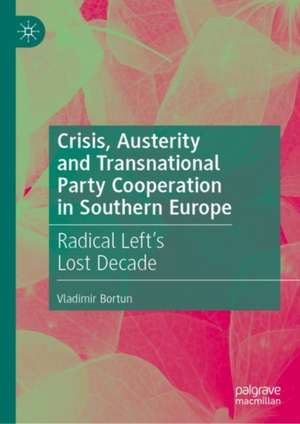Crisis, Austerity and Transnational Party Cooperation in Southern Europe: The Radical Left's Lost Decade
Autor Vladimir Bortunen Limba Engleză Hardback – 24 oct 2023
Preț: 702.24 lei
Preț vechi: 826.16 lei
-15% Nou
Puncte Express: 1053
Preț estimativ în valută:
134.41€ • 138.51$ • 113.47£
134.41€ • 138.51$ • 113.47£
Carte tipărită la comandă
Livrare economică 01-15 martie
Preluare comenzi: 021 569.72.76
Specificații
ISBN-13: 9783031391507
ISBN-10: 3031391500
Ilustrații: XV, 332 p. 1 illus.
Dimensiuni: 148 x 210 mm
Greutate: 0.57 kg
Ediția:1st ed. 2023
Editura: Springer Nature Switzerland
Colecția Palgrave Macmillan
Locul publicării:Cham, Switzerland
ISBN-10: 3031391500
Ilustrații: XV, 332 p. 1 illus.
Dimensiuni: 148 x 210 mm
Greutate: 0.57 kg
Ediția:1st ed. 2023
Editura: Springer Nature Switzerland
Colecția Palgrave Macmillan
Locul publicării:Cham, Switzerland
Cuprins
Chapter 1. United we stand? European integration and radical left transnational cooperation.- Chapter 2. The storm after the calm: Crisis, austerity and political turmoil in Southern Europe.- Chapter 3. The rise and stagnation of the radical left in Southern Europe: SYRIZA, Bloco, Podemos.- Chapter 4. “We shall overcome”: Transnational party cooperation in times of crisis.- Chapter 5. Cooperation by proxy: political foundations, social movements and intellectual networks.- Chapter 6. A lost decade: Incentives and challenges for transnational party cooperation.
Notă biografică
Vladimir Bortun is a political scientist working on left parties, political elites, and transnational politics. He is currently based at the Department of Social Policy and Intervention at the University of Oxford, UK.
Textul de pe ultima copertă
"Bortun’s book is the most comprehensive analysis of cooperation between contemporary radical left parties in Southern Europe. It provides detailed, comparative analysis of why the radical left still struggles to develop transnational cooperation. It will be an essential work for those interested in the radical left, transnational cooperation, political radicalism and European politics."
—Dr. Dan Keith, University of York, UK
“Bortun provides a forensic examination of the failure of radical left parties in Southern Europe to establish a common front against austerity during the Eurozone crisis. Based on in-depth elite interviews, it makes an important contribution to our understanding of the challenges facing left parties and transnational party cooperation”.
—Dr. Paolo Chiocchetti, Humboldt University of Berlin, Germany
"Bortun’s detailed analysis reveals the difficulties for the left within the EU, particularly the centrality of domestic politics and the incompatible visions concerning European integration. It pays witness to the fact that the EU is still much composed of states – and that the space of manoeuvring has shrunk considerably over the last decade."
—Catarina Príncipe, University Institute of Lisbon, and University of Coimbra, Portugal
The most internationalist of all party families, the radical left has paradoxically always lagged behind in its cooperation at the EU level. The previous decade, however, the transnational character of the Eurozone crisis and its austerity-centred management provided a strong incentive to remedy that. By focusing on the relations between three prominent members of this party family at the time (SYRIZA, Podemos, Left Bloc), this book shows how and why the transnational cooperation on the radical left largely failed to deliver in a propitious context. With implications for the study of other party families,the book lays out the key factors that prevented the European radical left from coming together to provide an alternative to the neoliberal status quo in the EU.
Vladimir Bortun is a political scientist working on left parties, political elites, and transnational politics. He is currently based at the Department of Social Policy and Intervention at the University of Oxford, UK.
—Dr. Dan Keith, University of York, UK
“Bortun provides a forensic examination of the failure of radical left parties in Southern Europe to establish a common front against austerity during the Eurozone crisis. Based on in-depth elite interviews, it makes an important contribution to our understanding of the challenges facing left parties and transnational party cooperation”.
—Dr. Paolo Chiocchetti, Humboldt University of Berlin, Germany
"Bortun’s detailed analysis reveals the difficulties for the left within the EU, particularly the centrality of domestic politics and the incompatible visions concerning European integration. It pays witness to the fact that the EU is still much composed of states – and that the space of manoeuvring has shrunk considerably over the last decade."
—Catarina Príncipe, University Institute of Lisbon, and University of Coimbra, Portugal
The most internationalist of all party families, the radical left has paradoxically always lagged behind in its cooperation at the EU level. The previous decade, however, the transnational character of the Eurozone crisis and its austerity-centred management provided a strong incentive to remedy that. By focusing on the relations between three prominent members of this party family at the time (SYRIZA, Podemos, Left Bloc), this book shows how and why the transnational cooperation on the radical left largely failed to deliver in a propitious context. With implications for the study of other party families,the book lays out the key factors that prevented the European radical left from coming together to provide an alternative to the neoliberal status quo in the EU.
Vladimir Bortun is a political scientist working on left parties, political elites, and transnational politics. He is currently based at the Department of Social Policy and Intervention at the University of Oxford, UK.
Caracteristici
Analyses the factors that may stimulate or, on the contrary, hinder transnational party cooperation Focuses on the case studies of SYRIZA in Greece, Podemos in Spain, and Left Bloc (Bloco) in Portugal Covers a wide variety of formal and informal channels for transnational party cooperation
